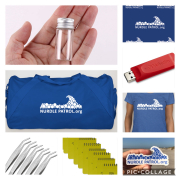
Organizations can now create their own local Nurdle Patrol citizen science project! Nurdle Patrol is a project where volunteers conduct 10 minute surveys looking for tiny plastic pellets (nurdles) along waterways around the country in an effort to identify high concentrations that could lead to the source of plastic being released. With funding from the Matagorda Bay Mitigation Trust, Nurdle Patrol is expanding all over the country by creating Startup Kits for the nurdle-collecting cause. As a result of last year’s environmental lawsuit against Formosa Plastics Corp., who had been illegally discharging plastic pellets from their plant in Point Comfort, Texas, the Mitigation Trust was established to fund numerous environmental projects in the area, allowing Nurdle Patrol to make their Startup Kits. These kits will enable different organizations around the U.S. to start a Nurdle Patrol citizen science project in their area, whether in a coastal community, along a river, or at the edge of a lake, with their efforts contributing to one centralized goal: to prevent microplastics from entering the environment.
Some key benefits for organizations starting up their own Nurdle Patrol include public participation in their cause, making change in their local community, media attention highlighting the group’s efforts, and all for a free cost program that is fun to conduct for individuals or groups of concerned citizens.
Included in the kits are tools, merchandise, and informational materials. A flash drive with a training video and presentation on nurdles, as well as instructional rack cards, will explain how volunteers can accurately survey their waterways and where to input their data when they are finished. Each organization can determine how they want to cater this information to their specific community and geography. Organizations will also be sent Nurdle Patrol t-shirts, face buffs, and stickers to help spread the word about their local project. The only logo defining these materials is the Nurdle Patrol logo, so communities can truly make this their own project, independent from influences such as the Nurdle Patrol’s original sponsor, Mission-Aransas National Estuarine Research Reserve. Finally, the new Nurdle Patrol groups will be sent tools such as glass sampling bottles, tweezers, and field notebooks to aid in the surveying process.
All of the materials and information included are meant to be augmented and customized for the particular organization and project in different communities. In fact, the collection of local data can help support the proposal of fresh policies that can reduce plastic pollution in the city, county, or even state. In addition, each new project will have some unifying constants. Volunteers must conduct the surveys using the instructions and input all the data into NurdlePatrol.org. This will give Nurdle Patrol more information highlighting the scale of the problem, a crucial support for new bills to change policies about plastics reaching the waterways. One example is the promising Texas Nurdle Bill, backed by Nurdle Patrol data, which aims to reduce plastic pellet pollution in Texas and might be the blueprint for making this change in every state.
What does an organization need to do to receive a startup kit? If an organization would like to startup one of their own Nurdle Patrol citizen science projects, they simply need to commit to sampling at least one location monthly, adding their data into NurdlePatrol.org, and agree to adding their organization’s logo to NurdlePatrol.org as an official partner. With these new Startup Kits, any group can start surveying their local beaches, rivers, and lakes for nurdle pollution, contributing to Nurdle Patrol’s overall mission and helping their own communities stay clean from plastic pollution. Interested in receiving a Startup Kit, email jace@utexas.edu.
------------------------------------------------------------------------
About the author: Arya Das is a high school student from the San Francisco Bay Area. She is currently a senior, and plans to major in environmental engineering and work in pollution prevention or renewable energy after college. Arya works with reserve director Jace Tunnell to write articles for the citizen science project Nurdle Patrol.


